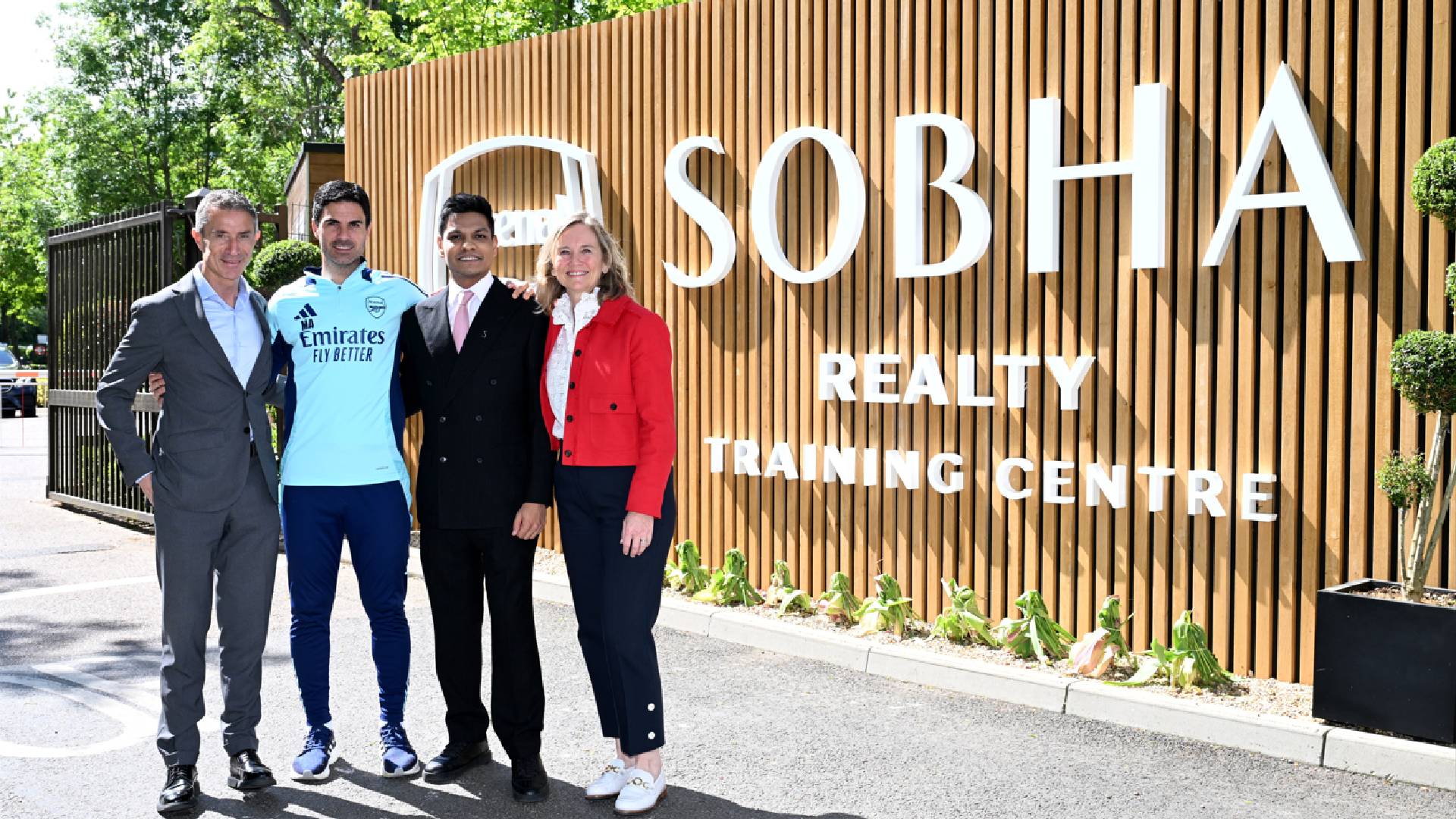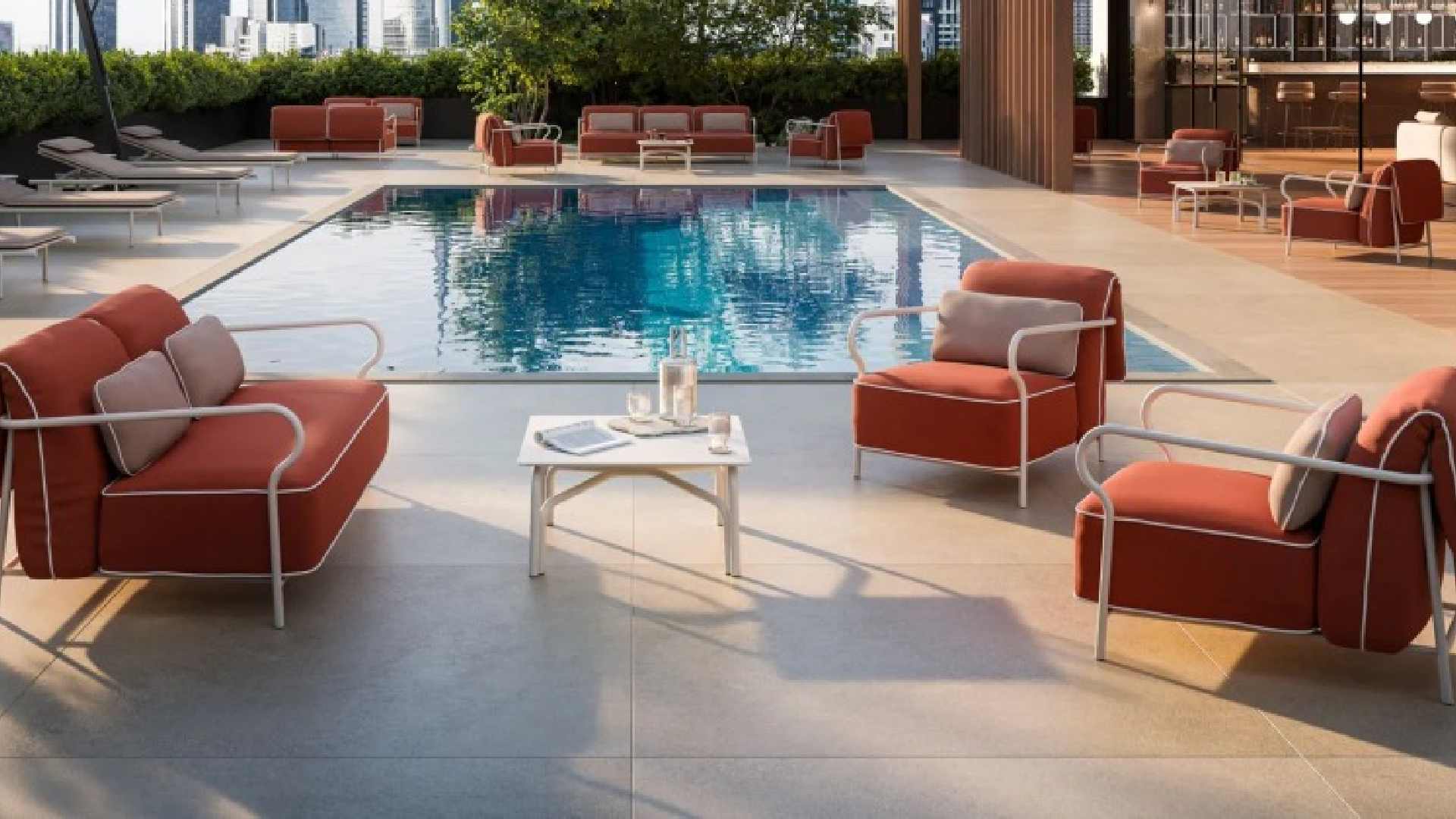Home Integrator
ARSENAL AND SOBHA REALTY CELEBRATE TWO YEARS OF PARTNERSHIP

Arsenal Football Club and Sobha Realty are proud to mark two years of our successful global partnership, and our work together in enhancing Sobha Realty Training Centre.
Sobha Realty joined our Arsenal family in 2023, and have since become one of our Principal Partners, with the naming rights to the Sobha Realty Training Centre in London Colney, and Sobha Realty branding on our training kit.
During that time, we have worked together to elevate the world-class facility through a number of developments, with enhancements to restaurant facilities and dressing rooms, a dedicated new building for our women’s first team, a refurbished media centre, and the addition of a new sauna and steam facilities.
We also launched The Art of Detail, our four-part series that shows the meticulous work behind the scenes at the Training Centre to support our teams perform at their best. Together, they reflect a shared drive to provide a high-performance environment that supports every detail of preparation and recovery. As we enter the next year of our partnership, we continue to work together to ensure the Sobha Realty Training Centre remains a world-class environment for players and staff.
Ashish Parakh, Group Chief Sales & Marketing Officer, Sobha Realty said: “Over the past two years, our partnership with Arsenal has grown into a powerful synergy, and we take immense pride in what we have built together. This collaboration, rooted in shared values of excellence, precision, and performance, now goes beyond sport and real estate. It is united by a commitment to craftsmanship, innovation, and continuous improvement. The Sobha Realty Training Centre stands as a testament to these ideals, reflecting our joint vision to create environments where talent thrives and potential is realised. As we enter the next phase of our journey, we remain dedicated to further enhancing this world-class facility and deepening our relationship with the Arsenal family.”
Juliet Slot, Chief Commercial Officer at Arsenal, said: “Our partners play a vital role in supporting our ambition and goals as a club, and we’re proud to work with such a brilliant range of brands who are the best at what they do. Sobha Realty have been an integral part of this journey over the past two years and counting – helping us to create the best possible environment for our people and players to perform at their best, and supporting our vision to win major trophies. We look forward to what’s to come and all that we can continue to achieve together.”
Home Integrator
SOBHA REALTY HONOURS 20 YEARS OF DUBAI UNDER HIS HIGHNESS SHEIKH MOHAMMED BIN RASHID AL MAKTOUM, VICE PRESIDENT AND PRIME MINISTER OF THE UAE AND RULER OF DUBAI, WITH A SPECTACULAR DRONE SHOW TRIBUTE

To mark the 20th anniversary of His Highness Sheikh Mohammed bin Rashid Al Maktoum’s accession as the Ruler of Dubai; Sobha Realty, a leading global luxury real estate developer, organized a spectacular drone show as a tribute to celebrating two decades of the emirate’s transformation, global standing, and enduring ambition.
Speaking on the occasion, Mr. Ravi Menon, Chairman of Sobha Group, said: “On behalf of Sobha Realty, I extend my deepest appreciation to Highness Sheikh Mohammed bin Rashid Al Maktoum for two decades of exemplary leadership that have elevated Dubai into a global destination for ambition, opportunity, and quality of life. His Highness’ vision has extended far beyond the city’s skylines and infrastructure, guiding the nation forward by prioritizing knowledge, excellence, and innovation as the foundation progress.”
Commenting on the milestone, Mr. Francis Alfred, Managing Director of Sobha Realty, said: “Dubai’s journey from bold ambition to global excellence stands as a testament to a leadership philosophy. Under His Highness’ guidance, the city has evolved into one of the world’s most strategically competitive and future-ready destinations.”
Marking the 20th anniversary, Sobha Realty staged a specially curated drone show on January 7, lighting up Dubai’s skyline in tribute to the milestone and reflecting the city’s spirit of progress, unity, and innovation.
Since its entry into the Dubai market in 2003, Sobha Realty has grown in tandem with the emirate, delivering landmark residential, lifestyle, and mixed-use developments that reflect Dubai’s ambition and uncompromised standards of quality. This progress is driven by a steadfast dedication to excellence in design, craftsmanship, and timely delivery. The anniversary celebrations underscore Sobha Realty’s continued commitment to contributing to Dubai’s long-term vision, defined by excellence, purposeful growth, and creation of enduring value.
Home Integrator
ME FITOUT SETS NEW BENCHMARK IN UAE’S HIGH-RISE INTERIORS, SUCCESSFULLY DELIVERS REEM ELEVEN

ME FITOUT, a fast-growing interior fit-out company, successfully completed the joinery and fit-out works at Reem Eleven, a 25-storey residential tower with a built-up area of over 20,000 sqm, developed by SAAS properties at the heart of Reem Island, Abu Dhabi. The project serves as a testament to the company’s growing capacity to execute complex, large-scale residential interiors that combine precision, craftsmanship, technology and sustainability.
The first phase of the project encompassed complete joinery installations across 20 floors, which includes bespoke wooden doors, wardrobes, kitchen units and cabinets. These units were custom-built at ME FITOUT’s state-of-the-art manufacturing facility in Dubai Investment Park. The second phase of the project focused on public areas, including the installation of premium wall claddings, integrated seating, decorative joinery, and cabinets, tailored to deliver timeless design precision and durability.
Sherif Nagy, CEO of ME FITOUT, said: “The successful delivery of Reem Eleven’s joinery and fit-out works demonstrates the scale of precision, discipline and innovation needed for high-rise residential projects in the UAE’s competitive market. The country’s interior fit-out industry is projected to surpass USD 4.13 billion by 2030, driven by accelerated urban growth and the country’s evolving appetite for sustainable, high-performance living spaces. Aligning with Saas Properties’ vision of creating unparalleled living and working environments has enabled us to raise execution standards across design quality and craftsmanship throughout the project.”
“Beyond addressing market demands, our fully integrated manufacturing and project delivery model is advancing the objectives of ‘We the UAE 2031’ vision, UAE’s Green Agenda 2030 and the ‘Make it in the Emirates’ initiative by reinforcing local production capabilities, cutting down reliance on imports and raising the bar for quality, sustainability, and design excellence,” added Sherif.
As part of the project, ME FITOUT leveraged advanced European machinery and digital production-tracking systems to achieve maximum precision across large-volume outputs while minimising material waste. Every component of the project was manufactured using FSC-certified boards, low-VOC finishes, and recycled materials, reflecting the company’s commitment to sustainable manufacturing and compliance with the UAE’s environmental standards.
The company’s in-house design and production offered seamless alignment between structural layouts and interior details, helping ensure on-time delivery without compromising creative vision or craftsmanship quality. Along with its unwavering focus on safety and excellence, ME FITOUT continues to reinforce its reputation as a trusted partner for developers and consultants across the UAE.
As ME FITOUT expands its residential, commercial, and hospitality portfolio, the joinery and fit-out project at Reem Eleven marks a significant milestone for the company. It showcases the company’s capability to deliver future-ready interiors that align with the UAE’s objectives for innovation-driven construction, sustainable practices and world-class design standards.
Home Integrator
AN EXCLUSIVE UNOPIÙ COLLECTION AT WESTERN FURNITURE: ITALIAN ELEGANCE WITH AN ORIENTAL SPIRIT FOR OUTDOOR SPACES

Western Furniture, the UAE’s leading destination for luxury interiors, proudly presents Unopiù, a renowned Italian outdoor furniture brand redefining outdoor living—where design meets nature through timeless materials, sculptural forms, and sustainable innovation.
Unopiù’s renowned collections embody the philosophy of “Where Luxury Meets Nature”, blending artisanal expertise with contemporary aesthetics to create settings that exude balance, beauty, and tranquility.
Among the most admired creations in the Unopiù world is The Chelsea Collection introduces an oriental-inspired aesthetic through sculptural teak frames, low Japanese-style seating, and soft white cushions that embody serenity and warmth. Its extendable dining table and two-seater sofas are distinguished by compact volumes and clean lines, while the Chelsea Sunlounger showcases refined craftsmanship with adjustable back and leg rests, discreet wheels for easy movement, and the option of a plush cushion for elevated comfort. Completing this panorama of outdoor artistry, the Pevero Island stands as a masterpiece of circular design in smooth teak (Ø160 cm), paired with soft Nuvola-hued cushions to create an inviting centerpiece for terraces, gardens, and poolside retreats. Together, these pieces reflect Unopiù’s vision of outdoor living: spaces that balance modern design with the warmth of natural materials, where every detail evokes Italian refinement and timeless luxury.
A timeless icon of Unopiù style, the Ginger Director’s Chair, features a frame made of premium-quality teak with seat and backrest in Cotone cotton fabric, complemented by either a seat cushion or beige Canatex covers (a sustainable hemp-blend fabric composed of 70% PVC and 30% polyester). Exclusive, versatile, and designed for daily use, this chair is a true protagonist of any environment, capturing a personal interpretation of relaxation and refined simplicity.

Another highlight is the Salò Sofa, part of the prestigious Salò 2025 Collection. This piece symbolizes timeless elegance and advanced functionality in outdoor furniture. Inspired by the enchanting landscapes of northern Italy, particularly the captivating charm of Lake Garda, the collection combines modernist design with premium materials to create outdoor sofas and armchairs that stand out for their sophisticated style and extraordinary comfort.

With over four decades of design excellence, Unopiù continues to champion sustainable living through the use of ethically sourced teak, durable weather-resistant materials, and an eco-conscious production ethos. Its collections embody the meeting of tradition and innovation, an approach that resonates with Dubai’s commitment to design-led sustainability and creative excellence.
-

 Tech News1 year ago
Tech News1 year agoDenodo Bolsters Executive Team by Hiring Christophe Culine as its Chief Revenue Officer
-

 VAR9 months ago
VAR9 months agoMicrosoft Launches New Surface Copilot+ PCs for Business
-

 Tech Interviews2 years ago
Tech Interviews2 years agoNavigating the Cybersecurity Landscape in Hybrid Work Environments
-

 Tech News6 months ago
Tech News6 months agoNothing Launches flagship Nothing Phone (3) and Headphone (1) in theme with the Iconic Museum of the Future in Dubai
-

 Tech News2 years ago
Tech News2 years agoBrighton College Abu Dhabi and Brighton College Al Ain Donate 954 IT Devices in Support of ‘Donate Your Own Device’ Campaign
-

 VAR1 year ago
VAR1 year agoSamsung Galaxy Z Fold6 vs Google Pixel 9 Pro Fold: Clash Of The Folding Phenoms
-

 Editorial1 year ago
Editorial1 year agoCelebrating UAE National Day: A Legacy of Leadership and Technological Innovation
-

 Tech Features11 months ago
Tech Features11 months ago5 Urgent Questions About Healthcare Network Cybersecurity in the Middle East












